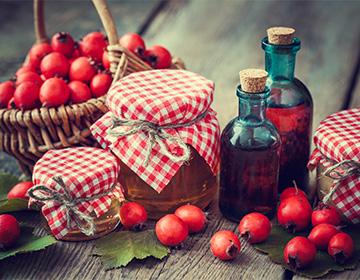The content of the article
It is a thick, amber-brown viscous liquid. It has a weak aroma of the plant and a sweet and sour taste. The tool is sold in pharmacies, affordable. The pharmaceutical industry produces pure rosehip syrup, as well as with various mineral and herbal supplements (with echinacea, iodine, vitamin E). Typically, the composition of the drug includes an aqueous extract of the plant and a sugar solution. Ascorbic and citric acids are also added to the extract.
Properties and indications for the use of syrup
High concentrations were noted in the plant:
- ascorbic acid;
- flavonoids;
- B vitamins;
- carotenoids;
- anthocyanins;
- pectins;
- organic acids.
In certain concentrations, these compounds pass into the aqueous extract from the fruits, respectively - are present in the sweet preparation. This gives it the following effects:
- stimulates the metabolism;
- boosts immunity;
- enhances the production of bile;
- improves digestion;
- regulates the nervous system;
- eliminates dyspeptic phenomena;
- stimulates regeneration processes;
- prevents vitamin deficiency.
According to the instructions for use, the indications for taking the medicine are as follows:
- asthenic conditions;
- vitamin deficiency C (lack of ascorbic acid);
- recovery period after illness.
Given the range of beneficial effects of rose hips, syrup can also be used for:
- increased physical and mental stress;
- during colds, SARS, bronchopulmonary ailments;
- with violations in the liver and gall bladder;
- with digestive disorders;
- for the prevention of colds;
- with damage to the skin, muscles, bones (to accelerate regeneration);
- with intoxication;
- to restore the body with exhaustion;
- for the prevention of vitamin deficiency in malnutrition.
The use of the drug was noted in metabolic disorders - disorders in the thyroid gland, malfunctions of cholesterol metabolism. Soft diuretic effect is relevant for edema, infectious and inflammatory diseases of the urinary system.
Dosage
The drug is taken two to three times a day. The action does not depend on the time of administration and combination with food. Although herbalists still recommend drinking the medicine half an hour before the meal. For syrups from different manufacturers, the dosages may vary, so you need to focus on the information in the specific instructions. But usually the recommendations are:
- adults - one or two tablespoons;
- older children (seven to 12 years old) - one dessert spoon;
- middle-aged children (four to six years old) - one teaspoon each;
- young children (two to three years) - half a teaspoon.
With acute symptoms of the disease in adults, the dose can be increased to the upper limit. Baby - build up only on the recommendation of a doctor.
The medicine can be taken in its pure form, as well as diluted in water, added to tea instead of sugar. It is undesirable to pour it into boiling water - this destroys vitamin C.
Rosehip syrup contraindications
The drug is considered safe and natural, but has contraindications:
- individual sensitivity to the plant;
- acute form of gastrointestinal diseases;
- the presence of gallstones;
- dyskinesia of the bile ducts;
- bronchial asthma;
- hypervitaminosis C;
- age up to two years;
- bleeding disorders.
Taking the medicine requires caution and prior consultation with the doctor in the following cases:
- diabetes- the daily dose for an adult is 6 XE, due to the content of simple sugars, the drug is able to increase glucose values;
- pregnancy- ascorbic acid stimulates the adrenal glands, affects the mineral and carbohydrate metabolism;
- lactation- the use of herbal preparations can provoke allergic reactions in a child, colic, digestive disorders;
- childhood- in the presence of chronic diseases, ailments of a hormonal nature, the use of vitamin C is not always appropriate.
The syrup contains impressive concentrations of ascorbic acid. Therefore, when using the drug, the possibility of its interaction with other drugs should be considered. So, a parallel intake of salicylates can provoke the appearance of crystals in the urine. The use with iron is to enhance the absorption of metal. In large doses, vitamin C reduces the effectiveness of oral contraceptives. Subject to standard doses, background therapy is usually not needed. However, if the doctor prescribes increased dosages, he should be warned about taking other drugs.
Self cooking
Rosehip syrup is an affordable and common medicine, which can be found in the nearest pharmacy. If a wild rose grows nearby, you can make a restorative remedy yourself. By medicinal properties, it is not inferior to the pharmacy. Use fresh, fully ripened fruits that have not been frozen.
Recipe
- 400 g of fresh fruits, the plants are washed, cleaned of stalks and calyx.
- In a saucepan, bring to a boil 0.5 l of pure water.
- Prepared fruits are poured into boiling water. Leave to infuse for 10-20 minutes.
- After the infusion time, the fruits are crushed with a submersible blender or crush. Leave for another ten minutes.
- Filter the resulting mass through a fine sieve or several layers of gauze, squeeze the raw materials by hand.
- In a separate pan, 200 ml of water and 400 g of sugar are mixed. Bring to a boil and cook for ten minutes.
- Immediately after turning off the fire, the resulting rosehip extract is introduced into the syrup, mixed thoroughly.
- Hot liquid is poured into cans, sealed, stored in the refrigerator or in the basement.
- Adults can take the drug for a tablespoon, children for a teaspoon.
Rose syrup is used in courses lasting no more than 30 days. Optimal time is the off-season period. A sweet medicine will support the immune system, increase mental productivity, and help protect the body from stress and infections. With regular use, a general improvement in appearance is noted: the skin becomes cleaner, dandruff passes, the intensity of hair loss decreases.

